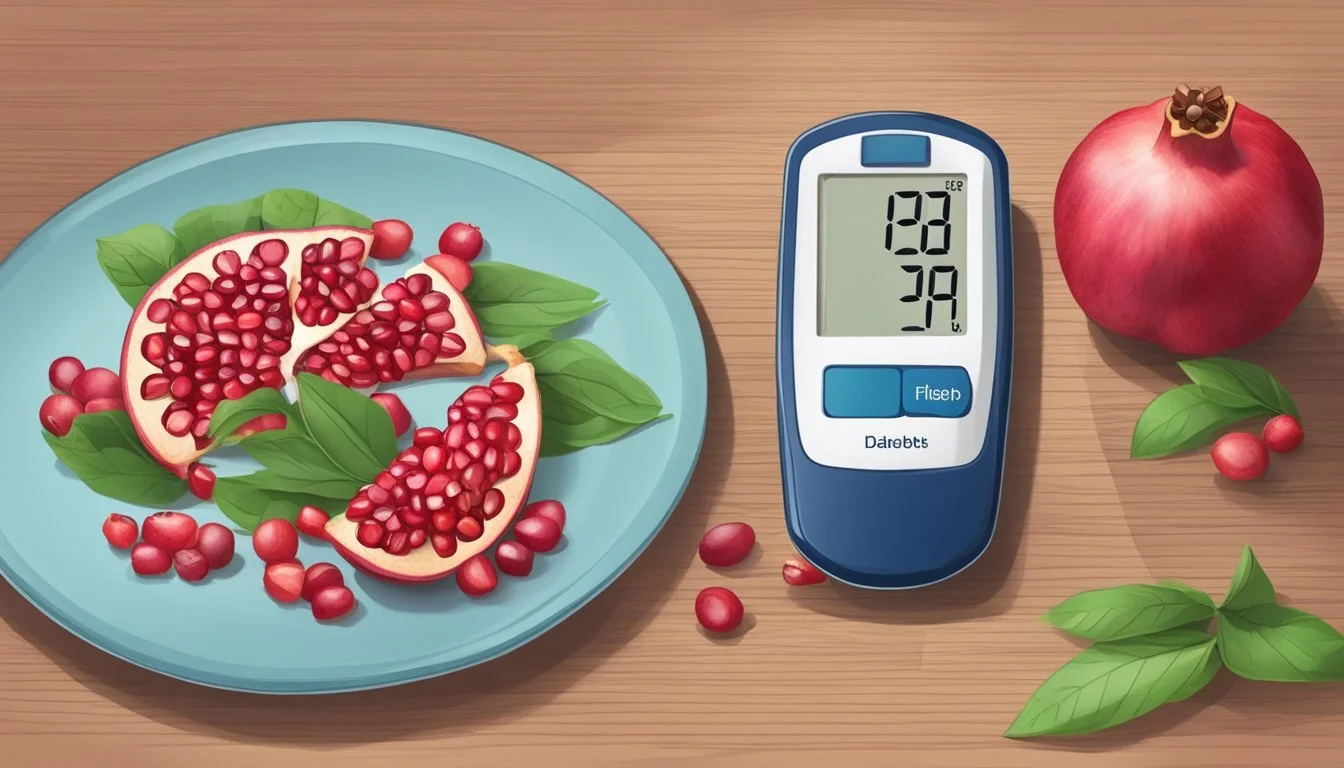Can Diabetics Eat Pomegranate?
Understanding the Impact on Blood Sugar Management
Individuals with diabetes often face nutritional challenges and must carefully consider their dietary choices. Fortunately, pomegranates can be a beneficial addition to their diet when consumed in moderation. This fruit contains antioxidant compounds that may help lower fasting blood sugar levels, particularly in type 2 diabetes. With diabetes management focusing on blood sugar control, incorporating low-glycemic index foods like pomegranates can be advantageous.
A common question posed by those managing diabetes is about the quantity of pomegranate that can be consumed safely. Considering that a balanced diabetic diet allows for 1-2 servings of fruit per day, a serving of pomegranate should be approximately half a cup of the seeds. This allows individuals to enjoy the sweetness and nutrients of the fruit without a significant spike in blood sugar levels.
Pomegranates have been valued historically in the Middle East, not only as a food but also for their medicinal properties, including diabetes treatment. Research conducted over the past decade suggests a link between pomegranate consumption and the prevention and treatment of type 2 diabetes, due to its potential anti-diabetic activities. However, it's important for individuals with diabetes to consult healthcare providers for personalized dietary advice to ensure that their intake of pomegranate, along with any other food, aligns with their overall diabetes management plans.
Understanding Diabetes
In discussing whether diabetics can consume pomegranate, it's critical to first understand the nature of diabetes and its relationship with diet. This section aims to unravel the intricacies of diabetes types and the pivotal role of dietary management in stabilizing blood sugar levels.
What Is Diabetes?
Diabetes is a chronic condition characterized by the body's inability to regulate blood sugar, or glucose, levels effectively. Glucose is a vital energy source for the body's cells, and insulin is the hormone responsible for facilitating its uptake from the bloodstream. Diabetic patients either do not produce sufficient insulin or their bodies cannot use insulin efficiently, leading to elevated blood glucose levels.
Type 1 vs Type 2 Diabetes
Diabetes manifests predominantly in two forms – Type 1 and Type 2:
Type 1 Diabetes: An autoimmune condition where the pancreas produces little to no insulin. Management typically includes lifelong insulin therapy.
Type 2 Diabetes: More prevalent, this form involves insulin resistance, where the body's cells do not respond correctly to insulin. While some cases may require insulin therapy, others can be managed with lifestyle changes and oral medications.
Importance of Diet in Diabetes Management
A healthful diet is a cornerstone of diabetes management. Control of blood sugar levels is fundamental for diabetic patients to prevent complications. A healthcare provider often recommends:
Monitoring carbohydrate intake to ensure it matches the individual's medication and physical activity levels.
Choosing foods with a low glycemic index to reduce blood sugar spikes.
Dietary adjustments, such as the inclusion or limitation of certain fruits, can be an essential aspect of managing diabetes, demonstrating the importance of understanding which foods are most beneficial for a diabetic's health.
Nutritional Profile of Pomegranate
Pomegranate, scientifically known as Punica granatum Linn, offers a distinctive nutritional profile rich in vital macronutrients, vitamins, minerals, and natural antioxidants. This profile makes it beneficial for overall health.
Macronutrients in Pomegranate
A medium-sized pomegranate, weighing approximately 282 grams, contains about 234 calories. The macronutrient breakdown of this fruit is as follows:
Carbohydrates: 52.7g
Protein: 4.7g
Fat: 3.3g
Dietary Fiber: Pomegranates are a significant source of fiber, which aids in digestion and can help regulate blood sugar levels.
Vitamins and Minerals
Pomegranate is an excellent source of several important vitamins and minerals:
Vitamin C: 10.2mg, which aids immune function and skin health.
Vitamin K: 16.4µg, crucial for blood clotting and bone health.
Potassium: 236mg, important for heart and muscle function.
Calcium: 10mg, essential for bone health.
The presence of these nutrients underscores the importance of pomegranate in a balanced diet.
Natural Antioxidants in Pomegranates
One of the most notable characteristics of pomegranates is their high level of antioxidant compounds known as polyphenols. These antioxidants contribute to the fruit's health benefits, potentially impacting blood sugar regulation and showing promise in diabetes management. Antioxidant polyphenols present in pomegranates include:
Punicalagins: Known to be particularly potent and responsible for much of the antioxidant activity.
Tannins, flavonoids, and other polyphenols: Work synergistically to support the body's defense against oxidative stress.
Benefits of Pomegranate for Diabetics
Pomegranate, a fruit native to the Middle East, offers specific health benefits that may positively affect individuals with diabetes. Its potential to lower blood sugar levels and fight inflammation plays a crucial role in managing this chronic condition.
Impact on Blood Sugar and Insulin Sensitivity
Pomegranates contain compounds capable of affecting blood sugar control. Consuming the fruit may lead to improvements in insulin sensitivity, allowing the body to use insulin more efficiently. Research indicates that components in pomegranate juice could help reduce fasting blood sugar levels in individuals with type 2 diabetes. However, it is important to note that while beneficial, pomegranates do also contain natural sugars, requiring mindful consumption to ensure it does not disrupt blood glucose management.
Anti-Inflammatory Properties
Inflammation is a key player in the development of insulin resistance, a condition often preceding and accompanying diabetes. The anti-inflammatory properties of pomegranates may combat this issue. Its antioxidants help in neutralizing harmful free radicals, which can lead to inflammation and contribute to the progression of heart disease among diabetic patients. This anti-inflammatory effect supports the maintenance of healthy insulin signaling pathways.
Cardiovascular Health
Pomegranates are known for their cardioprotective benefits. For diabetics, who are at an increased risk of developing heart disease, incorporating pomegranate into their diet can impart heart health benefits. The fruit's juice and pulp are rich in antioxidants, which can help in lowering low-density lipoprotein (LDL), commonly referred to as 'bad' fat, and improving overall cardiovascular health. Ensuring heart health is intact is crucial in diabetes care because of the close link between diabetes and heart disease.
Pomegranate Consumption and Diabetes
Pomegranates are considered beneficial for diabetics due to their antioxidant properties and potential effects on blood sugar levels. Understanding how to incorporate pomegranate into a diabetic diet is crucial for managing glycemic control.
How Pomegranate Affects Glycemic Index
Pomegranates have a relatively low glycemic index (GI), which means they cause a slower and more gradual rise in blood glucose levels. The fruit's natural sugars, such as fructose, are part of carbohydrates that contribute to the overall GI. Importantly, the fiber content in pomegranates can help moderate blood sugar spikes by slowing the absorption of sugar.
Pomegranate Juice vs Whole Fruit
Whole Pomegranate:
Fiber: Contains dietary fiber, important for digestive health and blood sugar regulation.
Sugar: Natural fructose without added sugars.
Pomegranate Juice:
Fiber: Lacks the fiber found in the whole fruit.
Sugar: Often contains added sugars, which can lead to higher glycemic responses.
When considering pomegranate juice or whole fruit, the whole fruit is often a better option for those managing diabetes.
Guidelines for Diabetics Consuming Pomegranate
Diabetics should:
Consult Healthcare Provider: Speak with a healthcare provider to understand individual dietary needs.
Moderation: Limit fruit intake to 1-2 servings daily, which may be about 1/2 cup of pomegranate seeds per serving.
Whole Fruit Preference: Opt for the whole fruit rather than juice to take advantage of the fiber content and avoid added sugars.
Monitor Blood Sugar: Keep an eye on blood sugar levels to see how pomegranate consumption affects individual glycemic control.
As with any dietary consideration in diabetes management, personal monitoring and healthcare provider guidance are key in determining the appropriate intake of pomegranates.
Integrating Pomegranate Into a Diabetic Diet
When considering pomegranates as part of a diabetic diet, one must take into account their carbohydrate content, nutritional value, and the glycemic index. Pomegranate seeds and juice can be incorporated in moderation.
Recipes and Serving Ideas
Pomegranates offer versatility in diabetic-friendly recipes. Seeds can be sprinkled over salads or mixed into oatmeal to add a burst of flavor without a significant increase in carbs. They can also serve as a tangy garnish for savory dishes, combining well with leafy greens and roasted vegetables. For a refreshing option, one might consider using pomegranate seeds in infused water, which provides the fruit's flavor without a concentrated source of sugar like in juices.
Salads: Toss a handful of seeds into a green salad.
Oatmeal: Sprinkle seeds atop a bowl of oatmeal for added fiber.
Balancing Pomegranate with Other Foods
Pomegranates have a moderate carbohydrate content, and balancing them with low-carb foods can help avoid blood sugar spikes. Pairing the fruit with foods high in fiber and protein can slow the absorption of sugar into the bloodstream. As pomegranates have a low glycemic index, integrating them into a meal can complement a diet aimed at managing obesity and regulating blood sugar.
Proteins: Combine seeds with a source of protein, like Greek yogurt.
Fibers: Add seeds to a vegetable stir-fry (What Wine Pairs Perfectly With Vegetable Stir-Fry?) rich in fibrous ingredients.
Considerations for Daily Intake
While pomegranates possess a low glycemic index, the quantity of intake is crucial for individuals with diabetes. Health professionals often recommend one pomegranate a day as a safe amount. Pomegranate juice should be consumed with caution due to its potential to elevate blood sugar more quickly than the seeds. Opt for whole pomegranate seeds to benefit from the fruit's full nutritional value, including its fiber content.
Scientific Research on Pomegranate and Diabetes
Numerous studies demonstrate that pomegranate possesses various compounds with potential anti-diabetic properties, such as punicalagin and ellagic, gallic, oleanolic, ursolic, and uallic acids. Current research focuses on how these components impact metabolic variables and inflammation in type 2 diabetes.
Studies on Pomegranate Polyphenols
Research identifies punicalagin and ellagic acid as key polyphenols in pomegranate that exhibit anti-diabetic actions. These compounds, along with gallic, ursolic, and oleanolic acids, help reduce oxidative stress and inflammation—two significant factors in the progression of diabetes. Investigation into tannins and anthocyanins, especially those in the juice sugar fraction, reveals their role in enhancing antioxidant enzyme activities and their potential in inhibiting reactive oxygen species formation.
Effect of Pomegranate on Metabolic Variables
Clinical trials suggest that pomegranate components influence various metabolic variables. For instance, they may affect transcriptional factors involved in glucose regulation and lipid metabolism. Additionally, the consumption of pomegranate has been correlated with the modulation of pathologic markers like hs-CRP and the improvement in the balance of resistin formation—a contributor to insulin resistance in diabetes.
Longer-Term Effects and Ongoing Research
Longitudinal studies and ongoing research are essential to substantiate the short-term findings. While clinical trials have pointed toward beneficial impacts on individuals with type 2 diabetes, such as improved insulin sensitivity and reductions in central obesity, more extensive and long-term studies are necessary to fully understand the therapeutic effects of pomegranate components like punicic acid, which is known for its anti-inflammatory and metal chelation activity—potentially mediating diabetic complications.
The continuous examination of this medicinal plant is crucial, as it will contribute to the development of evidence-based dietary guidelines and therapeutic interventions for diabetes management.
Potential Risks and Precautions
While pomegranates are generally considered beneficial, they may pose certain risks and necessitate precautions for individuals with diabetes. It is crucial to balance the intake and be aware of interactions with medications.
Possible Interactions with Medication
Pomegranates and their juice can interact with some medications, potentially affecting how they work. Specifically, pomegranate has been known to interact with blood pressure medications, altering their intended effects. Diabetic patients should be cautious, as these interactions might lead to unexpected changes in blood pressure.
Overconsumption and Blood Sugar Levels
Although pomegranate can have a positive impact on heart health and bad cholesterol, consuming it in large quantities can lead to elevated blood sugar levels due to its natural sugar content. This is particularly critical for individuals managing diabetes, as overconsumption could undermine glycemic control.
Recommended: Small portions of pomegranate or its juice.
Avoid: Large servings that could spike blood sugar.
When to Consult a Healthcare Provider
Individuals with diabetes should consult a healthcare provider before making significant dietary changes, including the introduction of pomegranate or its juice. This consultation is especially vital for those with conditions such as prostate cancer, as the healthcare provider can give tailored advice considering the patient's overall health and specific medications.
Consultation Recommended:
Before adding pomegranate to one's diet.
If there are concerns about interactions with current medications.
If experiencing signs of atherosclerosis or changes in traditional diabetic indicators post consumption.
Cultural and Historical Significance of Pomegranate
The pomegranate is not only a fruit with rich nutritional value; it also carries substantial cultural and historical significance, particularly in traditional medicine and various regional histories.
Pomegranate in Traditional Medicine
In traditional medicine, pomegranates are revered for their medicinal qualities. The fruit, especially in the Middle East, is historically recognized as a medicinal plant. It contains punicalagin, a potent antioxidant believed to benefit health. Ayurvedic therapies in India and Unani medicinal practices have long utilized pomegranate for its supposed healing properties.
Historic Use in Various Regions
Across various regions, the history of pomegranates is deeply entrenched. It is native to the Middle East and has been cultivated since ancient times. The fruit has been a symbol of health, fertility, and longevity. It was often featured in ancient texts and artworks, symbolizing an array of cultural beliefs and practices.
Conclusion
Pomegranates possess qualities that may benefit individuals with diabetes. As part of a healthy diet, they offer nutritional advantages due to their low glycemic index, which helps in maintaining stable blood glucose levels. In addition, pomegranates are rich in antioxidants and may improve insulin sensitivity.
For effective diabetes management, moderation is key. Individuals with diabetes should incorporate pomegranate seeds in controlled portions. It's vital to consider the fruit's sugar content and account for it within the daily carbohydrate allowance.
Recommended intake: Pomegranate seeds can be consumed, but portion size needs to be monitored.
Nutritional profile: High in antioxidants, fiber, vitamins, and minerals beneficial for a holistic diabetic diet.
Blood Sugar Impact: Can help lower blood sugar levels when consumed as part of a balanced diet.
In summary, pomegranates can be included in the diet of those managing diabetes but should be balanced with other nutritional needs. It is suggested to consult a healthcare provider or a dietitian for personalized dietary advice.







